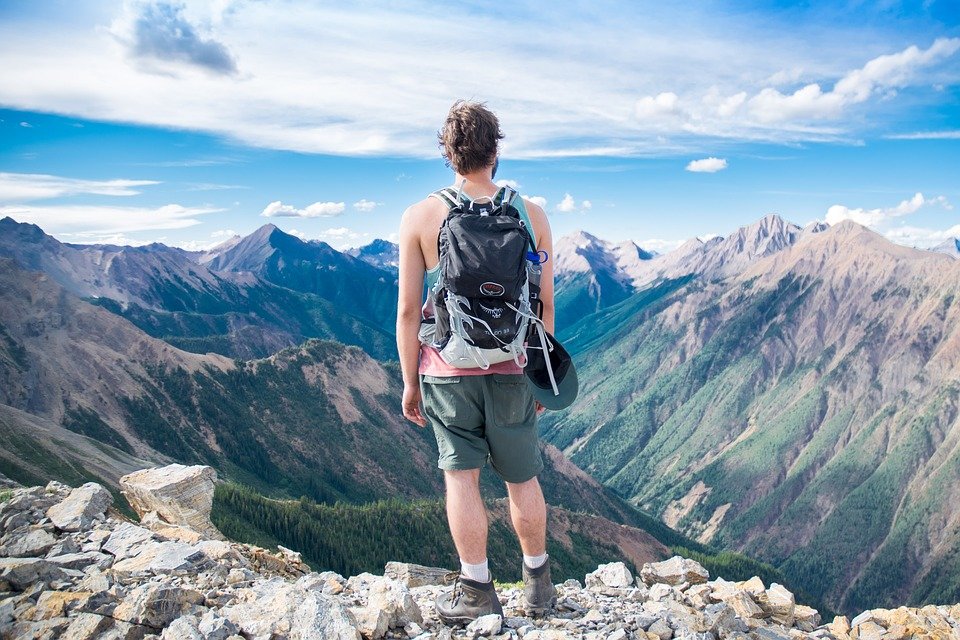8 Useful International Travel Tips for First-Time Travelers
Overcome your pre-departure jitters with our 8 useful international travel tips for first-time travelers. Follow these tips and travel abroad like a pro!

It's a great, big world and we’re so stoked that you’re about to get out there and explore it!
No matter how much you’ve traveled in your home country there’s something equally thrilling and terrifying about taking your first trip overseas. I've been globetrotting full-time for nearly 4 years to almost 60 countries -- and I've learned a thing or two along the way, including some top travel tips for first-time travelers.
Going somewhere completely new, different, and foreign is endlessly exciting but can also be a bit scary and confusing. But, it doesn’t have to be! Follow these simple tips to get your logistics in order to ensure smooth sailing.
1. First Things First: Get Your Passport Well in Advance
The most important of all tips for first-time international travelers? Avoid unnecessary stress by applying for a passport well before your expected departure. Don’t book a flight or make any arrangements that can’t be changed until you have that little book that opens doors around the globe in your hand. Some international flights require that you enter your passport number when booking or during online check-in, so it's best to just have it first before you start booking anything..
As of 2019, the application fee for U.S. passports is $145 for adults and $115 if you’re under 16. If you’ve already gone ahead and started booking and paying for your trip you can pay an extra fee for your passport if you need it in a jiffy (the official term is "expedited"). Usually, you can receive an expedited passport within 2 weeks of your application.
Once your passport arrives, make paper and digital copies of the identification page. Give one to your parents to keep safe and keep another in your wallet. Take a photo on your phone and keep a quality digital copy on your Google Docs. Once you get your visa stamp, take a picture of that as well.
You’ll need your passport more often than you might think -- not just during flights! Many hotels are required to take a scan of your passport identification page. Don’t be alarmed by this, it’s totally normal. Some may even hold your passport during your stay as collateral to ensure you pay for your accommodation but also to keep it safe from theft. (This isn't as common as it used to be before the days of online booking, but don't be surprised if it happens in some far-flung countries.)
While most countries technically do require that foreigners have their passport on them at all times this isn’t the most advisable thing to do as there are pickpockets and bag snatchers all over the globe. This is where that paper copy you made comes in handy. Should you have any encounters with foreign law enforcement it’s pretty standard to show them the picture of your passport and visa on your phone and then explain that the physical copy is back at your hotel -- just offer to go retrieve it if they need to see it.
Never keep your passport in an easy-to-access pocket on your bag. The absolute best place for your passport to be is in a safe at a hotel or in your locker at a hostel.
2. Decide Where to Go on Your First International Trip

Perhaps you’ve been dreaming for a long time about seeing elephants in Thailand or visiting the pyramids in Egypt. Maybe you don't know where exactly, but you just know you need to go. If you’re overwhelmed by all the incredible places you can see now that you have a passport then it may be hard to choose which destination to visit on your first international trip.
Here are some important things to ask yourself as you narrow down a literal world of choices:
- Do you want to stay close to your home country or go far away? On your first trip, it's okay to start somewhere close and head further afield as you get more comfortable being an international globetrotting traveler.
- Do you speak a foreign language? Or, are you comfortable traveling to a place where you don't speak the language? France was the first country I visited that wasn’t an English or Spanish speaking country and I was completely overwhelmed by not being able to communicate.
- Are you eager to make new friends and connecting with locals? If so, you may want to consider booking a guided tour -- that's a great way to connect with fellow travelers and many tours allow you opportunities to meet local guides too.
- What are you looking forward to the most? Are you drawn towards beautiful buildings and architecture, eating delicious or unusual foods, relaxing on a beach, climbing a mountain, or do you just want to party? It might help to jot down a quick list in order to figure out 1-2 things that are the most appealing aspect of your first-time overseas.
- What is your comfort level for traveling to countries that have a culture and lifestyle that differs greatly from yours? Will you feel uncomfortable around poverty, pollution, and crazy traffic? There’s no shame in first visiting countries where you feel safe.
Once you've thought about these questions, hopefully, you can narrow down your choices to one or two countries, depending on how much time you’ve allocated for your first international trip. In case you're still unsure, a good recommendation for first-time travelers is to visit Western Europe or the United Kingdom. Most people speak English (even if it's not the national language), there are good transportation options (buses, trains, and airplanes), and lots of unique cultures to experience. Australia and New Zealand are equally easy, but slightly more adventurous destinations as they require long-haul flights and a bit more strategic planning as they’re quite large and offer so many exciting things to do.
If you really want to go somewhere that’s completely different from the States, consider a trip to some locations that are familiar and used to travelers such as Costa Rica or Thailand. I’m always amazed when I meet young travelers who are overseas for the first time in Morocco or India-two of my favorite countries -- but places I could not have handled when I was an inexperienced traveler at 19.
3. Check to See if You Need a Visa
As you book your trip, make sure you check to see whether or not you'll need a visa to travel. A visa is a document issued by the country or countries you're visiting, which grants you permission to travel there for a certain number of days.
For most of Europe, the U.K., and many countries in Asia and Latin America, U.S. passport holders can travel without a visa or receive one on arrival. If you do need a visa though and you show up for your flight without it you won’t be allowed to board the plane -- talk about major bummer and loss of your hard-earned money.
U.S. citizens can find out visa regulations by visiting the U.S. Department of State website and searching for their destination.
4. Make Sure You Can Access Your Money Overseas

Gone are the days when you need to carry cash or travelers cheques (what are those?!) to travel overseas. Now, thanks to the internet, it's much easier to manage and access money while traveling all over the world.
Check in with your bank to see if you need to set up a travel alert while you’re abroad so your bank knows when and where you're traveling. You can also inquire about international fees, and whether they have partner banks in the destination that will help you save money on costly "foreign transaction" ATM fees. Or, you can avoid all of that by opening a free checking account with Charles Schwab or Ally. These are two banks that have no foreign transaction fees and reimburse ATM fees -- even while traveling!
Though your debit card will probably work everywhere on this first trip, it's important to have a good back-up plan. Try to take at least $100, a debit card, and a credit card with you on your first international trip. Always leave one card in your hotel room in case your wallet gets stolen -- this has happened to me way too many times. If your wallet gets stolen it’s not the end of the world because you’ll still have another way to access money!
5. Save Money by Comparing Transportation & Accommodation Options

Most international trips are going to require you to fly there, but for getting around your destination, consider other options such as buses or trains. Rio2Rome is a great tool for seeking all the route options from point A to point B and figuring out which mode of transportation will be quickest and cheapest.
Bus rides are usually the most cost-efficient and eco-friendly mode of transportation and also offer you the chance to take in the vistas and chat with locals. Some countries even have ride-sharing apps like BlaBlaCar which is common in Spain and Germany and can be more direct than a bus route.
Take a look at your options before booking your accommodation. While hotels are always a good option, don't forget to do research on hostel, guesthouse, and Airbnb options where you're traveling -- these offer you the chance to connect with other travelers and locals. Boutique hostels are becoming more common and are often times equipped with much nicer amenities than budget hotels.
Hostels tend to be more cost-friendly. I use Hostelz.com to compare prices for free between Hostelworld, Booking, Gomio, and other accommodation sites. Hostelz.com shows the price difference between each site and allows users to book directly through the site with the lowest fare. However, I prefer to make the actual reservation through Booking.com as there is no booking fee and usually reservations can be altered for free before the arrival date.
6. Book Everything in Advance
How far in advance should you start booking your trip? Unfortunately, with Covid still running its course, this is hard to tell. A recent survey found that contrary to past advice, booking close to your departure date will get you last-minute deals as airlines struggle to fill planes. Alternatively, survey results also concluded that the ideal time to book cheap flights to Europe was 180 days prior to departure.
If you're under 26 years old, you can get flight discounts just for being young! Look at flight search engines like StudentUniverse to nab a youth discount. No matter what, the best time to book is whenever you have the money and are ready to commit to your first international trip. Make sure you have exit flights for each country as many airlines won’t let you board the aircraft on a one-way flight.
Although I’ve been traveling long-term I still always book accommodation in advance too. The idea of showing up in a place after a long day of travel without knowing where I’m sleeping makes me anxious -- but some people find this thrilling. At the very least, have a place to stay booked for your arrival day. Customs forms almost always require you to list where you’ll be staying. Keep a business card from your accommodation on you in case your phone dies while you’re out in case you have trouble making your way back.
7. Give Yourself Enough Time to Get Over Your Jet Lag

As you start booking your first international trip, you may want to pack it all in. How many cities can you fit in one trip?! How much can you see in each day?! Take my advice: slow down, at least for the first day or two, to recover from the bane of every traveler: jet lag.
Recovering from a long-haul flight is challenging enough -- but when you add on a time change you’re bound to be a bit jet lagged. It can take up to a week to adjust for every eight time zones you change. So, if you're flying from Los Angeles to London, you can expect several days where your brain and body are adjusting to the new time zone.
Fight the jet lag by getting plenty of rest before your trip and slightly adjusting your schedule -- think staying up an hour or two later -- to try to get your body prepped. Do the same with meal times. Drink plenty of water before, during, and after the flight.
Once you arrive, do your best to avoid naps, even when your body is screaming for one. Take a stroll around your neighborhood to get a sense of local life and relax in a cafe for a bit -- coffee really helps! No matter what, be sure to consider whether you need an extra day or two in your schedule to adjust. I’m guilty of breaking all of these rules every time I fly from Asia to the U.S. and back again.
8. Keep Yourself Safe
Your first international trip may seem scary, but it's almost always scarier in your mind than it will ever be once you're traveling. Here are a few safety tips to keep in mind while abroad:
- Pickpockets and petty theft: to avoid becoming a victim, always keep an eye on your belongings and hold your bag tight. A crossbody bag or fanny pack are by far the most effective way to deter pickpockets. Never carry a backpack on just one shoulder or leave your bag on the ground or on the back of a chair. Avoid putting cellphones or wallets in back pockets. If you're really concerned, money belts you can wear under your clothes and theft-proof wallets are also good options.
- Stay in contact: You can register with the U.S. State Department's Smart Traveler Enrollment Program (STEP). That way, the local U.S. Embassy will know to get in touch with you in the case of a natural disaster, political unrest, or another emergency. If you are staying on a homestay or have a landlord, share these details with family back home so that they will have it should an emergency arise.
- Travel insurance: any seasoned traveler knows that travel insurance is a must. Get one that covers both health and property. When you are traveling, you are susceptible to disease and other injuries. You’ll hear horror stories of travelers who’ve been ill with malaria, staph infections, parasites, and more. From emergency evacuations to reimbursement for lost luggage, travel insurance can save you a lot of money in the unlikely event that something bad happens while you’re abroad.
- Above all, common sense: ask locals which areas of town or city neighborhoods you should avoid, travel with a buddy at night, don’t drink too much, especially if you are alone or not in a group of people you trust, and meet new potential friends in public places, at least at first. If using a dating app, keep the date public. And always, always follow your gut if a person or situation gives you a bad feeling.
While you shouldn't focus on the things that could go wrong, being aware of your surroundings and taking simple steps to keep yourself safe will go a long way in enjoying your new adventure.
Take the Leap into the Unknown
As your departure date gets closer, you may start to get more nervous as you get more excited -- this is your first time leaping out of the comfort and familiarity of your own country. That's kinda scary, but it eases with time, trust me. The benefits of travel and the thrill of experiencing a new place and new people far outweigh the stress of planning that first trip.
When you feel overwhelmed, just remember: every new destination involves some trial and error, even for seasoned travelers. Take any mishaps in stride and know that you're gaining valuable knowledge for the next time you board a flight. Have an amazing trip!
Read next: How to Travel like a Pro: Airport Tips & Tricks for Stress-Free Travel
